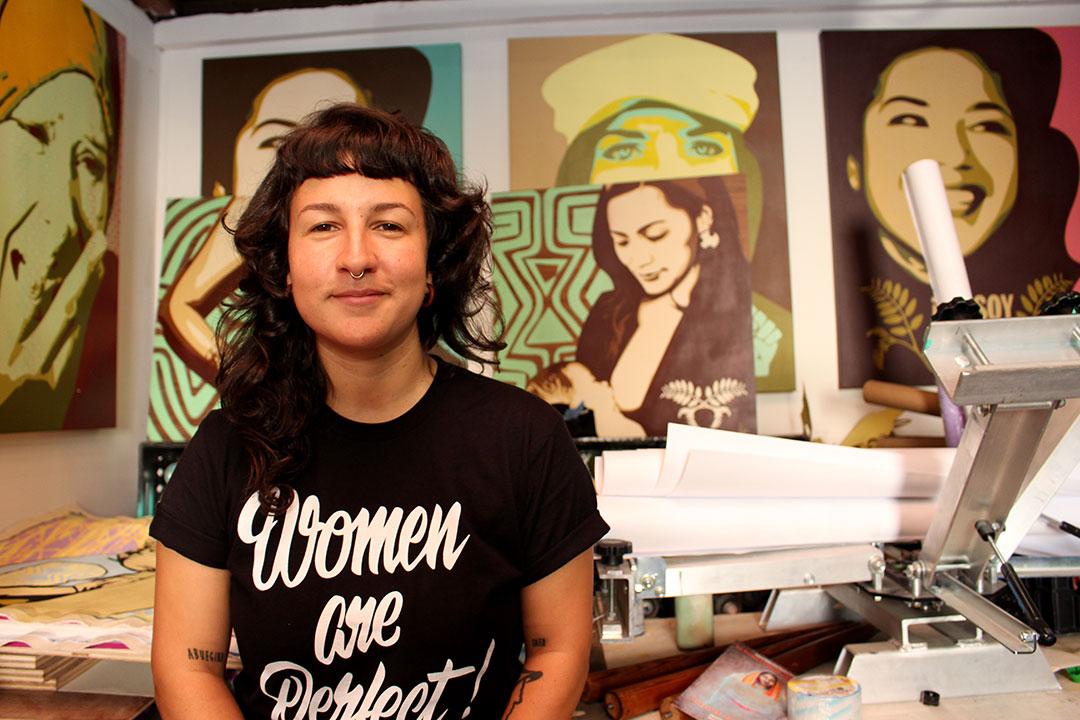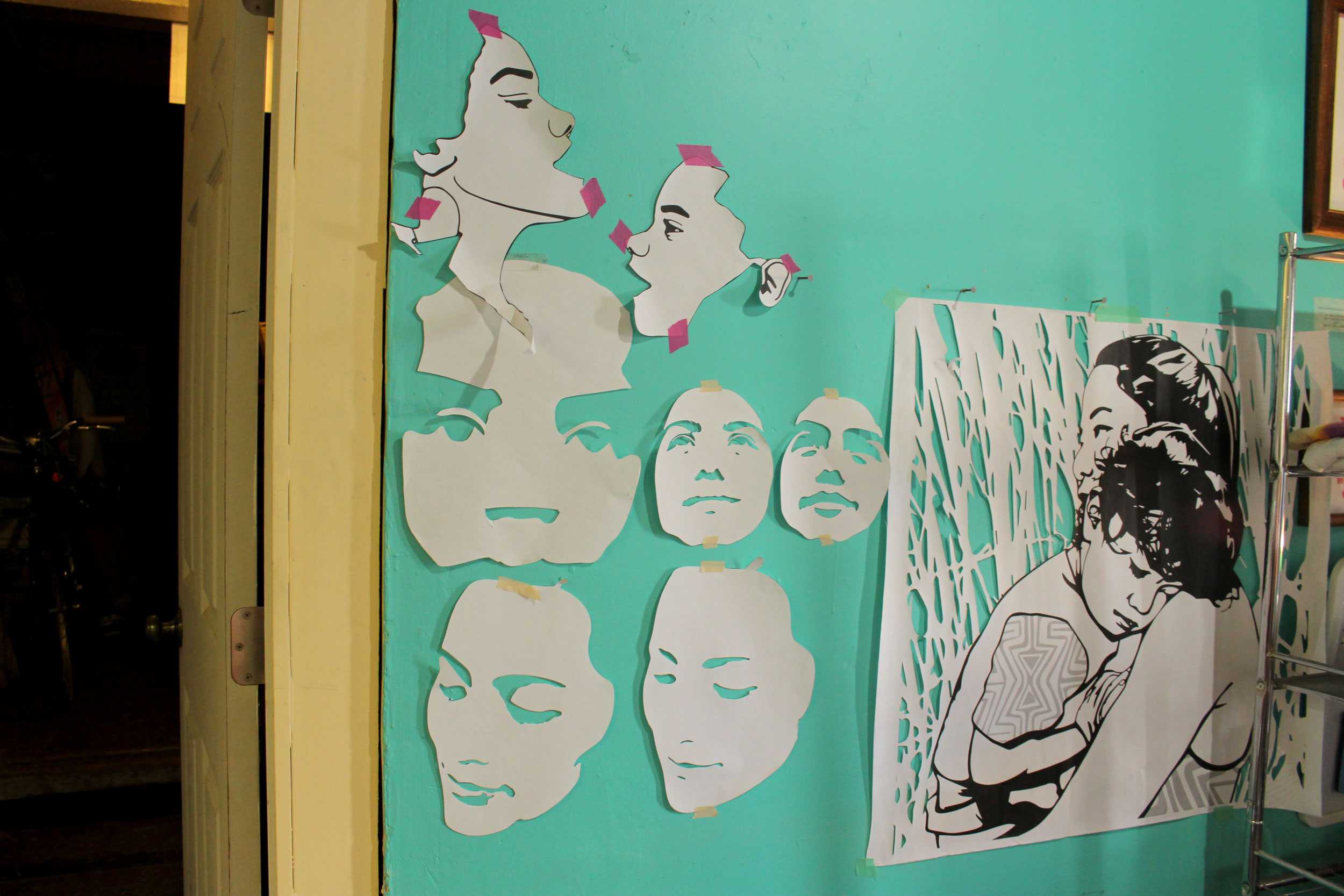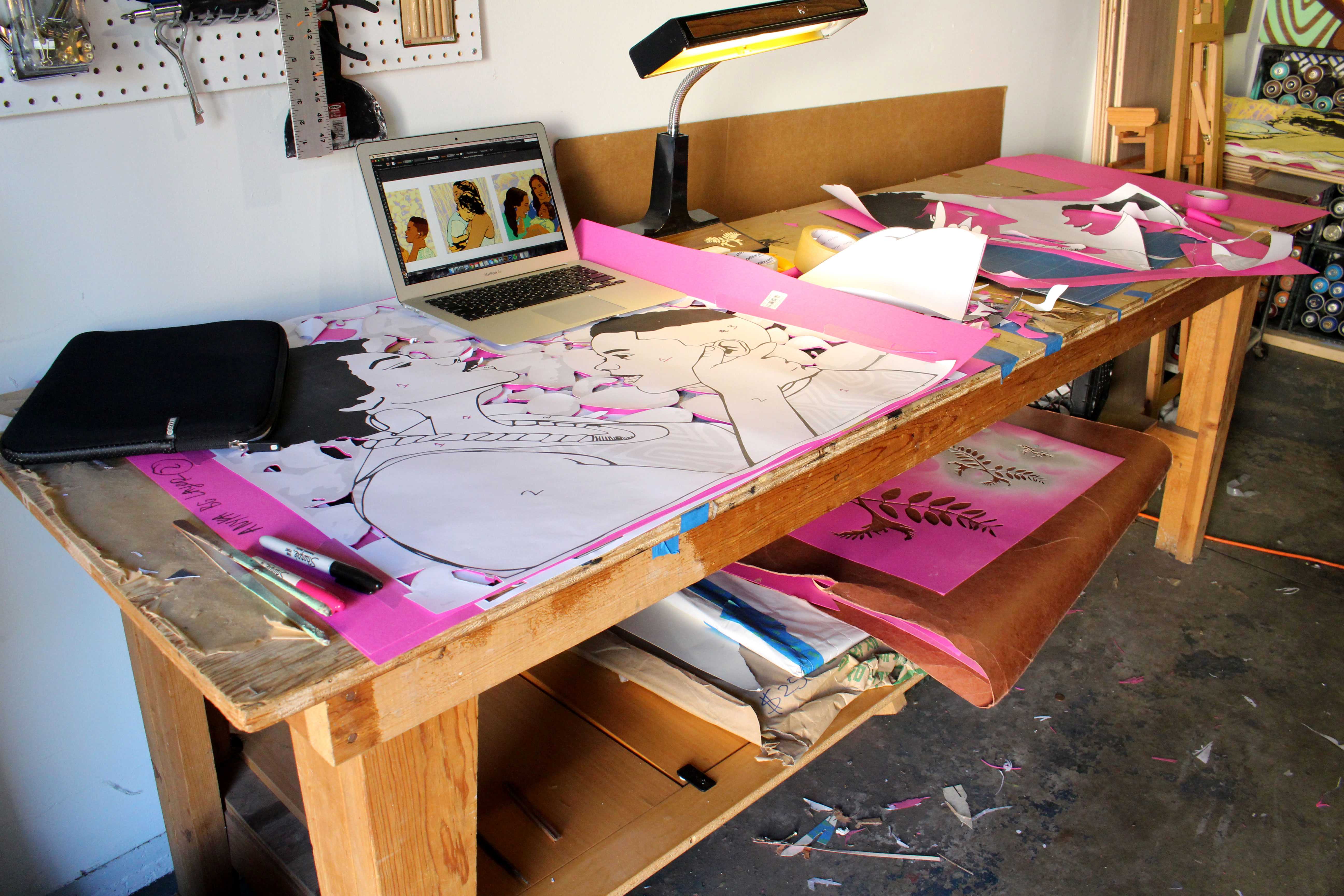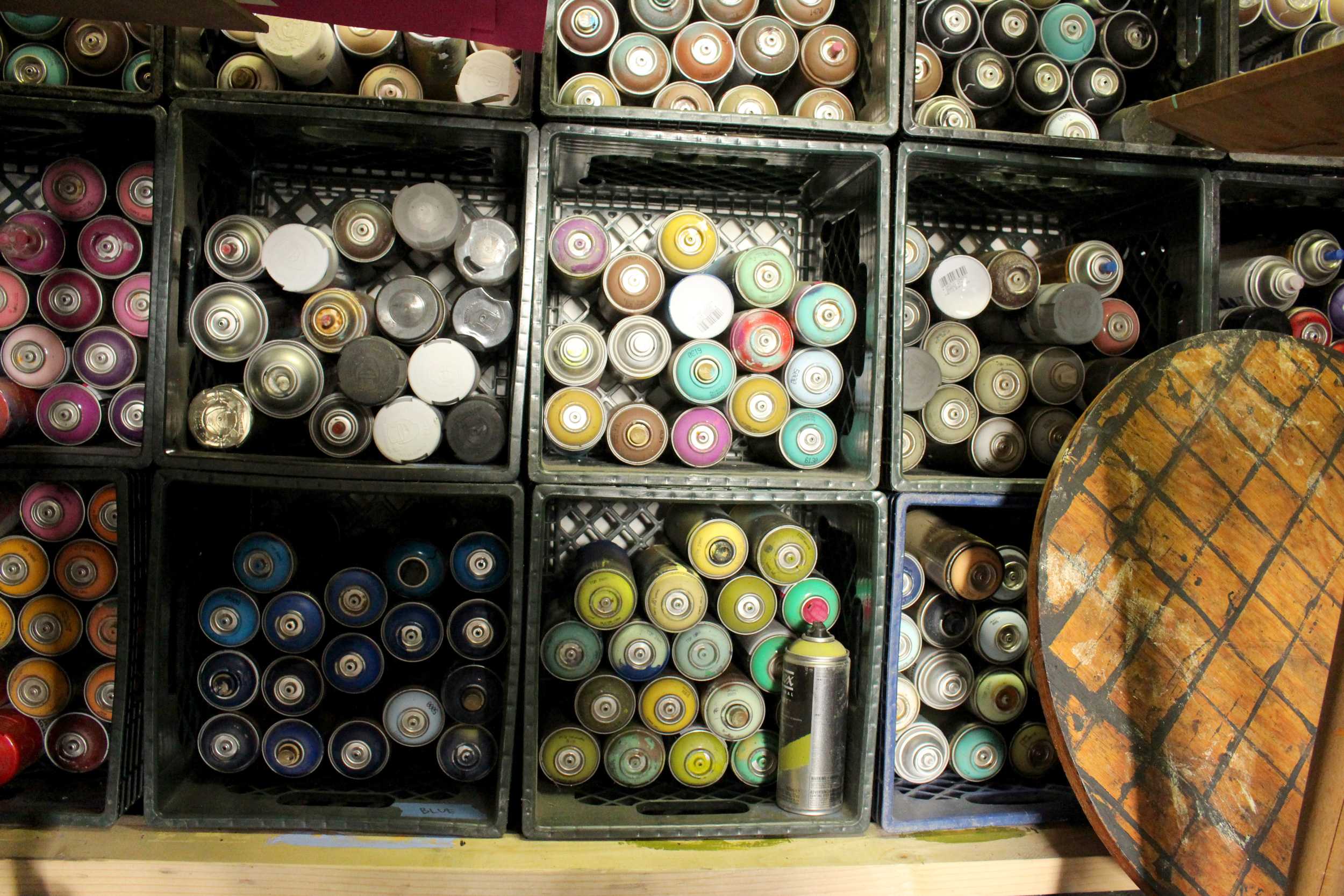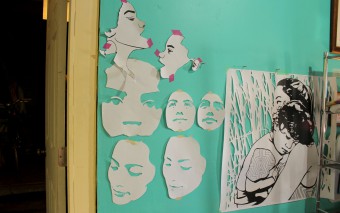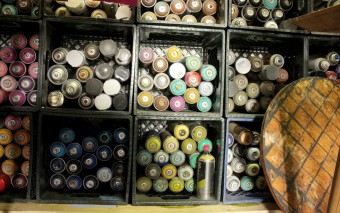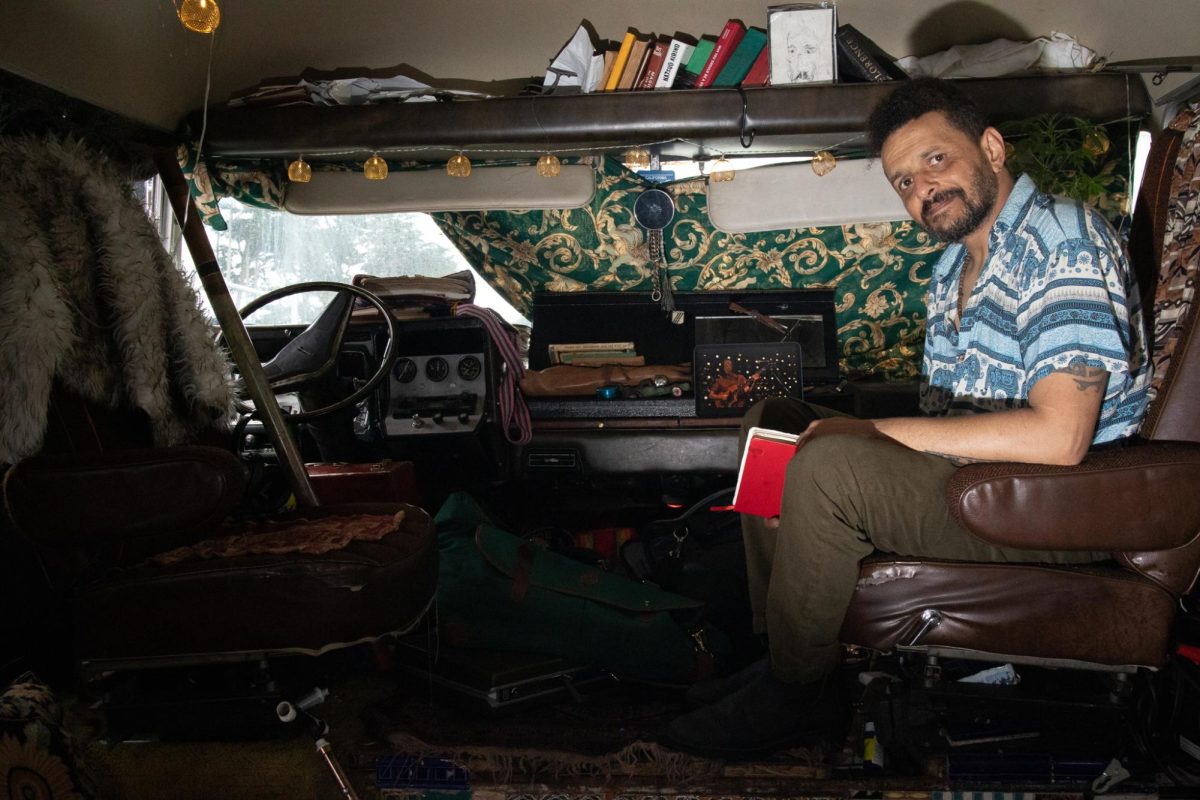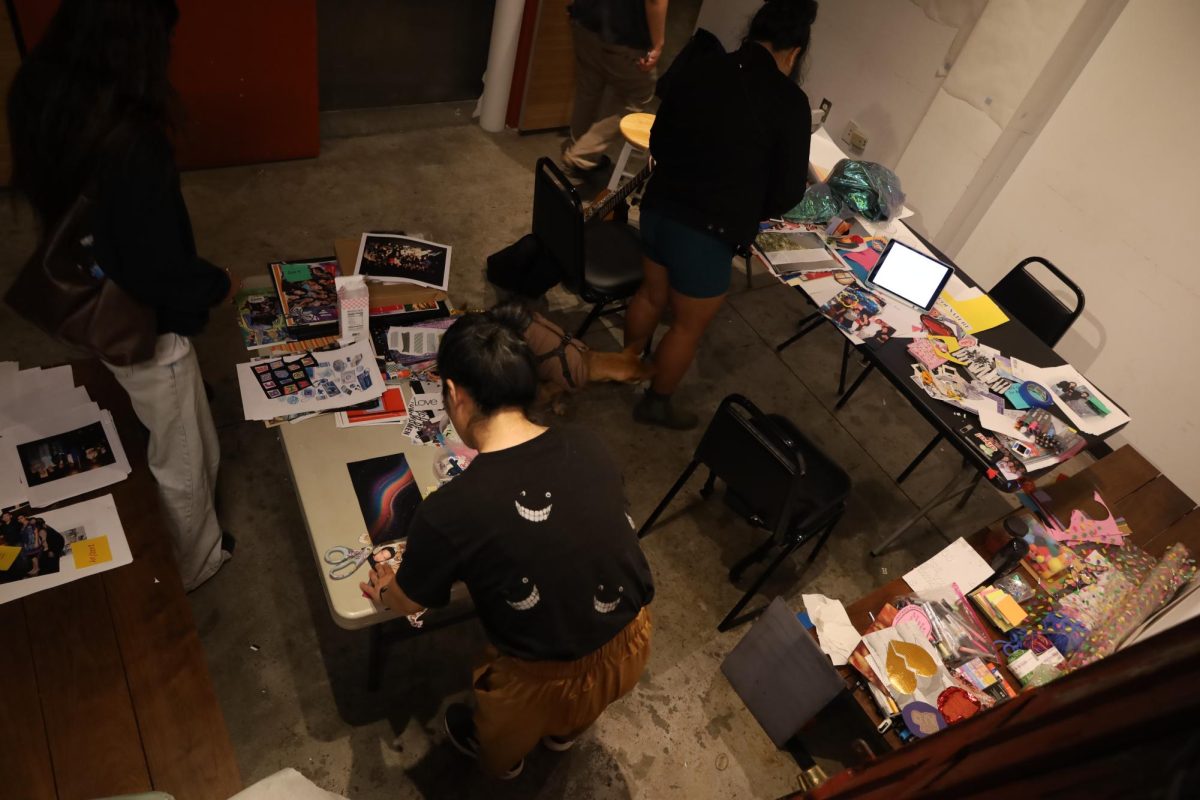Muralist Jessica Sabogal poses for a portrait in her studio behind La Galeria de Raza in San Francisco’s Mission District Thursday, Sept. 17. (James Chan/ Xpress)
By Oscar Gutierrez
[dropcap size=”50px”]T[/dropcap]he strong smell of paint escaped through the door of a small room tucked away at Galeria de la Raza in San Francisco’s Mission District. Stencils surrounded a desk, portraits of women covered the walls and Jessica Sabogal sat on a stool in a shirt that read “Women Are Perfect!” This was just another day in the office of the San Francisco native as she prepared to leave her mark on yet another wall.
At just 12-years-old, Sabogal got a hold of her first graffiti magazines through her brother. At that age, she never thought her work would get past her sketchbook, but knew her brother would be happy knowing about her progress in her artistic skills.
“My brother was into Hip-hop and graffiti was one of those elements that came with it,” Sabogal said. “And because I idolized him, I told myself I would learn graffiti. I grew up and told my parents, who are Colombian immigrants, that I would become an artist and they told me ‘you’re not going to be an artist; you’re going to be a doctor or a lawyer.’”
Years later, Sabogal graduated with a degree in political science, but also with a passion to do something on a bigger scale. She became fascinated by the idea of making art in public spaces with strong political messages–most popularized by artists like Shepard Fairey and Banksy. After creating her first stencil, she began publicly displaying her work. A stencil portrait she made of Chicana writer and theorist, Cherríe Moraga gained attention and soon went viral. Portraits of other women she found fundamental to her work followed and she was commissioned to create art for the cover of a book, which would be her first major public art display allowing for greater visibility.

[audio mp3="https://xpressmagazine.org/files/2015/10/24thstreetfinal.mp3"][/audio]
Three years ago, inspiration struck when Sabogal sat in complete admiration of her brother’s pregnant wife, she was compelled to create a project which would vocalize her appreciation for women’s bodies. She wanted others to know how important it is to understand women and their perfection.
“I saw her body morph into this perfect vessel to literally house the next generation, so I was like ‘damn, women are born so damn perfect!’” Sabogal said.
It was then that “Women Are Perfect” began. The campaign was simultaneously inspired by her frustration of the situation at the time in the Mission District, where women were continually being raped off the 24th Street corridor. Understanding that the powerful women in her neighborhood were walking down the street with a higher chance of being raped or assaulted did not add up to Sabogal.
“I was like ‘it doesn’t make sense, it doesn’t make sense,’” Sabogal said. “How we are made to do this amazing thing, yet we have to walk down the street fearing rape and abuse.”
She initially decided “Women Are Perfect” would be a campaign aimed at men. However, after having interactions with women that would deny being perfect because of the negative connotations attached with the word that position them as narcissistic, she decided the campaign would be aimed at women.
Photos by James Chan
Critics have been vocal in disagreement with Sabogal’s campaign, claiming that women should not strive for perfection because it is an unattainable goal. In the critiques of this particular campaign, the idea that women do not have to be perfect has been pushed forward by people that disagree with her work.
However, Sabogal invited the critics to better engage with the work and think outside of the limits. The claim that Sabogal is asking women to strive for perfection is not the intention of her campaign. Instead, she pushes the idea that perfection is not a goal, but something that women already posses. She claims that the vast amount of critiques have come from men, but she makes it clear that this work is simply not about them, it’s about women, in particular women of color who are not being represented.
She was previously making portraits of young Colombian women her father would bring back after his visits back home, but was soon inspired to document the women that surrounded her as she grew as an artist. This meant making portraits of people like her intern, friends and mother. Her interest in this dynamic was that it did not only serve a purpose, but promoted the idea to the artist community that she, much like many other women, were not that of white mainstream America. Sabogal was creating something different by portraying indigenous women from her community and her homeland in Colombia.
Her mother, Regina Otero-Sabogal was a witness to the shift in her artwork. She describes it as an activity she learned from her brother that unexpectedly transformed into a powerful political statement.
“There is so much violence against women in Colombia and for migrant women and their rights like a mother and a woman in the United States,” Otero-Sabogal said. “I appreciate that someone like my daughter can visually represent the power that everyday women have.”
Otero-Sabogal described Jessica as a someone who never gave up. She believes her daughter’s involvement in the community and surrounding herself with women, such as her neighbors, educators, community activists and other artists was a fundamental piece to her inspiration to create a project like “Women Are Perfect.”
Although the project began in early 2013, Sabogal did not see the effect until earlier this year when “Women Are Perfect!” t-shirts and stickers were made. Prior to that, she had taken her art on an international tour, painting murals in Colombia and Canada. She gave her audience access to post the stickers on street poles and signs, and the t-shirts caught the attention of many that were fascinated by the project.
For Sabogal, everything she is doing, she doesn’t take it as a point of pride.
“I feel like it’s not super awesome and rewarding to think that a woman shouldn’t get raped and a woman should be perceived as positive, awesome and perfect,” Sabogal said.
The amount of art that has been purchased and the attention it has gained internationally has been fundamental to her continual inspiration to create more work.
Ani Rivera, director of Galeria de La Raza, was one person who saw Sabogal’s potential and allotted her the space to create.
“Her narrative was very specific around writing and documenting communities that aren’t seen as much. Her ‘Women Are Perfect’ campaign was really us looking into how that’s really going against the grain and pushing patriarchal ideas and values that we live on,” Rivera said.
Rivera constructed a space for Sabogal to continuously build work that is relevant to the community while engaging her neighbors, friends and family to help her with anything from cutting stencils to painting the wall itself. Sabogal has been effective in making the gallery a site of collective artistic production.
She has been able to create a vast amount of work that encompasses all her intersecting identities as a lesbian Colombian artist. Most recently, a mural she painted with the words “Our existence will no longer be silenced. We require no explanations, apologies or approval,” which pictured a lesbian couple became a topic of major discussion. The mural was created in Montreal during the annual Decolonizing Street Art Convergence. The convergence is meant to bring some of the most powerful international indigenous street artists to create art for two weeks. She saw the convergence as an opportunity to create dialogue around issues that are simply not being talked about.
“Even though gay people can get married and women should be able to get equal pay as men, why is it so controversial for the words ‘Women Are Perfect’ to exist,” Sabogal said. “And why is it a big deal for me to produce a big lesbian mural in Canada? I am discovering it is a big deal because it is still not being talked about.”
Sabogal hopes to do a Latin American tour where she is able to stop in different countries and work on murals with communities of young women. She believes that the core of the “Women Are Perfect” campaign has been the power of collective projects.
“It takes a village to be able to do what I am doing,” Sabogal said. “It takes Galeria to give me a space, it takes my girlfriend to bring me meals when I have a deadline and everyone who shows up for the grander cause and that’s the beautiful thing. I want to thank the village.”


